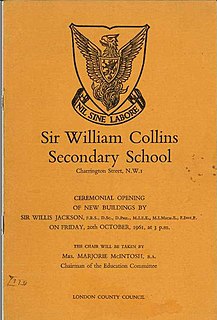
Royal Botanic Gardens, Kew is a non-departmental public body in the United Kingdom sponsored by the Department for Environment, Food and Rural Affairs. An internationally important botanical research and education institution, it employs 1,100 staff. Its board of trustees is chaired by Dame Amelia Fawcett.

The Wellcome Trust is a charitable foundation focused on health research based in London, in the United Kingdom. It was established in 1936 with legacies from the pharmaceutical magnate Henry Wellcome to fund research to improve human and animal health. The aim of the Trust is to "support science to solve the urgent health challenges facing everyone." It had a financial endowment of £29.1 billion in 2020, making it the fourth wealthiest charitable foundation in the world. In 2012, the Wellcome Trust was described by the Financial Times as the United Kingdom's largest provider of non-governmental funding for scientific research, and one of the largest providers in the world. According to their annual report, the Wellcome Trust spent GBP £1.1Bn on charitable activities across their 2019/2020 financial year. According to the OECD, the Wellcome Trust's financing for 2019 development increased by 22% to US$327 million.
Forest school is an outdoor education delivery model in which students visit natural spaces to learn personal, social and technical skills. It has been defined as "an inspirational process that offers children, young people and adults regular opportunities to achieve and develop confidence through hands-on learning in a woodland environment". Forest school is both a pedagogy and a physical entity, with the use often being interchanged. The plural "schools" is often used when referring to a number of groups or sessions.

Student voice is the individual and collective perspective and actions of students within the context of learning and education. It is identified in schools as both a metaphorical practice and as a pragmatic concern. Tech educator Dennis Harper noted that student voice gives students "the ability to influence learning to include policies, programs, contexts and principles."
The UK government's Microelectronics Education Programme ran from 1980 to 1986. It was conceived and planned by a Labour government and set up under a Conservative government during Mrs Thatcher's era. Its aim was to explore how computers could be used in schools in the UK. This was a controversial time for Conservative school policies.

Education in Rwanda has undergone considerable changes throughout Rwanda's recent history, and has faced major disruptions due to periods of conflict. Education was divided by gender whereby women and men had a different education relevant to their responsibilities in day to day life. Women were mostly taught housekeeping while men were mainly taught how to hunt, rear animals, and fish. This is because Rwanda was a community based society where every member had a specific contribution to the overall development of the community. Older family members like grandparents usually took on the role of Educators.

Regent High School (RHS), formerly South Camden Community School and Sir William Collins Secondary School, is a co-educational comprehensive secondary school in Somers Town, in the London Borough of Camden, England. The name was last changed in an attempt to shed what staff feared was a "negative perception" of the school rooted in its past. The school enjoyed an extensive rebuilding and refurbishment programme from 2011 to 2013. The school's accreditations include Healthy Schools, Sportmark, Leading Parent Partnership award and International Schools status.
Education in Colombia includes nursery school, elementary school, high school, technical instruction and university education.

Oasis Charitable Trust, commonly known as Oasis, is a UK-based Christian registered charity. It was founded by the Reverend Steve Chalke in September 1985. Chalke had been assistant minister at Tonbridge Baptist Church, Kent, for four years. He left this job with the aim of setting up a hostel for homeless young people. Oasis now has over 5,000 staff in the UK as well as thousands more volunteers.
Science Learning Centres are a UK government initiative to address the need for improved science education and development for teachers in England.

The Millennium Seed Bank Partnership, formerly known as the Millennium Seed Bank Project, is the largest ex situ plant conservation programme in the world coordinated by the Royal Botanic Gardens, Kew. After being awarded a Millennium Commission grant in 1995, the project commenced in 1996, and is now housed in the Wellcome Trust Millennium Building situated in the grounds of Wakehurst Place, West Sussex. Its purpose is to provide an "insurance policy" against the extinction of plants in the wild by storing seeds for future use. The storage facilities consist of large underground frozen vaults preserving the world's largest wild-plant seedbank or collection of seeds from wild species. The project had been started by Dr Peter Thompson and run by Paul Smith after the departure of Roger Smith. Roger Smith was awarded the OBE in 2000 in the Queen's New Year Honours for services to the Project.

Sing Up is a music education organisation that provides resources for singing activities for primary schools in England.
The Darwin Initiative is a UK Government funding program that aims to assist countries with rich biodiversity but poor financial resources to meet their objectives under the Convention on Biological Diversity (CBD); the Convention on International Trade in Endangered Species of Wild Fauna and Flora (CITES); and the Convention on the Conservation of Migratory Species of Wild Animals (CMS).

The Plant A Tree Today Foundation (PATT) is a non-governmental environmental organization with primary operations in the United Kingdom and Thailand. Established in 2005, PATT attempts to raise environmental awareness and foster better practices in less developed nations around the world, planting trees as a means to combat deforestation and climate change.

Oasis Academy Shirley Park is a mixed all-through school located within the Ashburton Learning Village complex in the Woodside area of Croydon, Greater London, England.
Atlantic Academy Portland, formerly known as the Isle of Portland Aldridge Community Academy, is a coeducational all-through school and sixth form for children aged 3 to 19. The school is located on two sites on the Isle of Portland in the English county of Dorset.
Knightsbridge Schools International Switzerland SA , also known as KSI Morges, in Morges, Switzerland, is a coeducational school with both local and international students aged 3–12. The school was previously known as Lake Leman International School. The school has closed.
Teacher quality is said to be the most important factor influencing learner outcomes. The Education for All Goals set by UNESCO have been achieved by some countries but many millions of children remain out of school or with poor teachers.

The UK Overseas Territories Conservation Forum (UKOTCF), also known as Overseas Territories Conservation, is a UK-based non-governmental organisation which promotes coordinated conservation in the UK Overseas Territories and Crown Dependencies. It is a not-for-profit organisation supported by grants, donations and subscriptions, and a registered charity and company.

The Herbier National De Guinée is the national herbarium of the Republic of Guinea. Attached to the Gamal Abdel Nasser University of Conakry it was established in 2009 to house a collection of plant specimens found within the country. Its mission is to research and conserve Guinea's botanical heritage and create a network of regional herbaria and botanical gardens and is responsible for contributing to the implementation of the Government's national research policy in the field of plant knowledge. The number of specimens currently housed is 9800 plant and mycological specimens. Since its foundation the HNG has partnered with the Royal Botanic Gardens Kew, a relationship which will continue until at least 2021.











